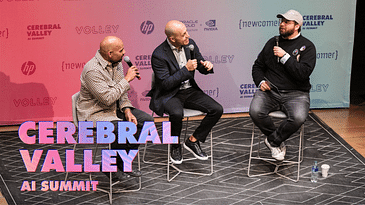We were delighted to kick off the 2nd Cerebral Valley AI Summit with Ali Ghodsi, CEO of Databricks, and Naveen Rao, co-founder of MosaicML.
Their encounter at our debut event in March led to Ghodsi buying Rao’s company, which had little revenue, for $1.3 billion. At our event on Nov. 15, the two discussed how the deal came together quickly after meeting at the conference dinner.
Thousands of enterprises around the world rely on Oracle Cloud Infrastructure (OCI) to power applications that drive their businesses. OCI customers include leaders across industries, such as healthcare, scientific research, financial services, telecommunications, and more.
NVIDIA DGX Cloud on OCI is an AI training-as-a-service platform for customers to train complex AI models like generative AI applications. Included with DGX Cloud, NVIDIA AI Enterprise brings the software layer of the NVIDIA AI platform to OCI.
Talk with Oracle about accelerating your GPU workloads.
Ghodsi recounted how he started spending some time with Rao and thought, “these guys are pretty good,” and then by chance noticed an employee he respected poking around with MosaicML and offering a strong endorsement. Soon Ghodsi was on the phone with the head of his deals team, who told him “if you want to buy these guys you have to do it this weekend.” Rao said by that point “you kind of know he’s going to pop the question,” and once they worked out the money, the deal was done.
The two executives certainly seemed to be in harmony as they touted the potential benefits from their combination, which in simple terms will bring MosaicML’s expertise in building specialized generative AI models to Databricks’ corporate data platform products, essentially super-charging Databricks for the generative AI era.
They were eager to defend the idea of open-source foundation models that are specific to certain tasks, rejecting the notion that general-purpose models like ChatGPT-4 will eventually swallow everything. (This conversation took place before OpenAI was thrown into chaos by its board of directors.)
Ghodsi said calls to limit open-source models on the grounds that they’ll be too easily exploited by bad actors a “horrible, horrendous” idea that would “put a stop to all innovation.”
“It’s essential that we have an open-source ecosystem,” he said, noting that even now it’s unclear how a lot of AI models work, and open-source research will be critical to answering those questions.
Rao added that many of the people making predictions about how AI would develop are “full of s**t.” On the safety question, he noted that cost alone would stand in the way of any existential risks for a long time, and in the meantime the focus should be on real threats like disinformation and robot safety.
Give it a listen
Get full access to Newcomer at www.newcomer.co/subscribe



